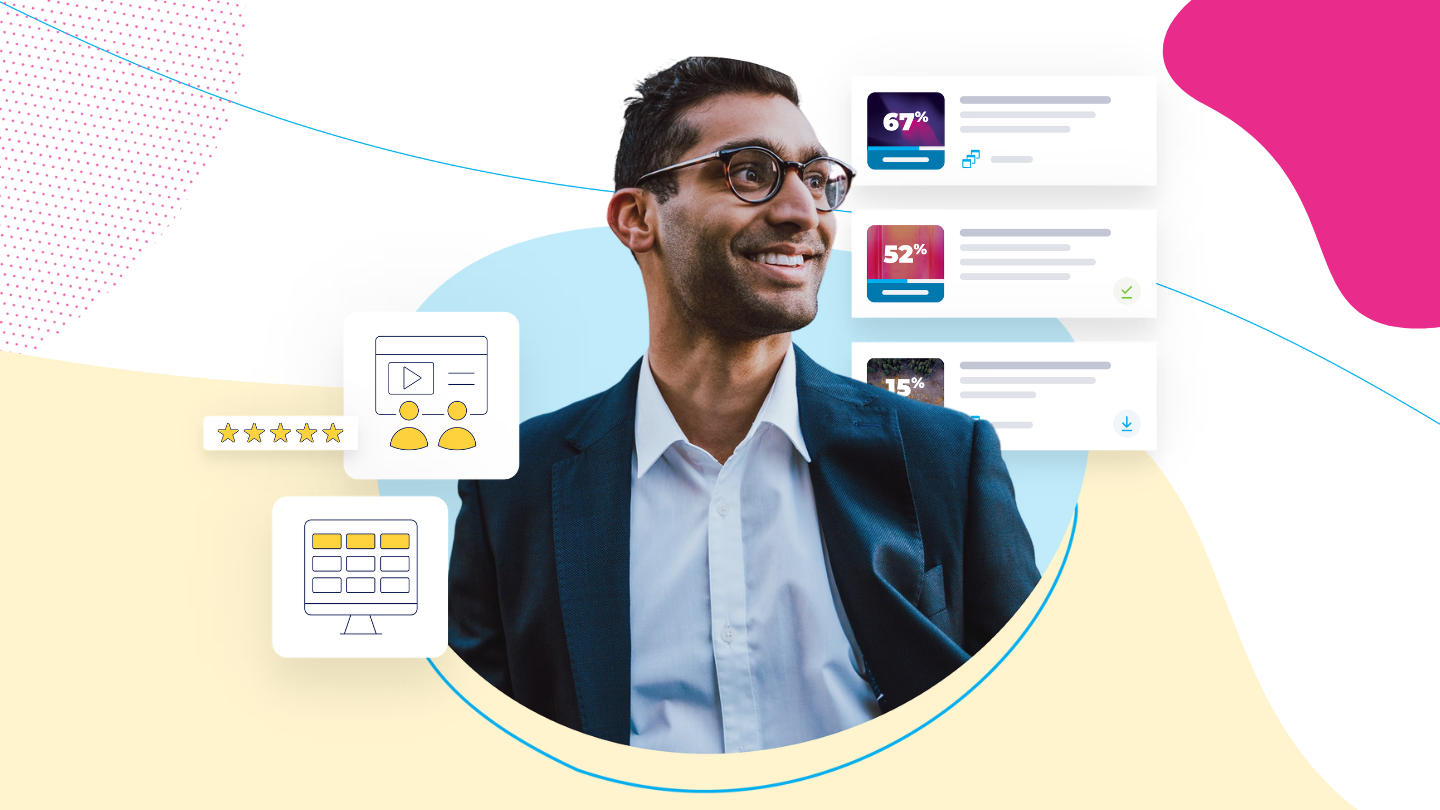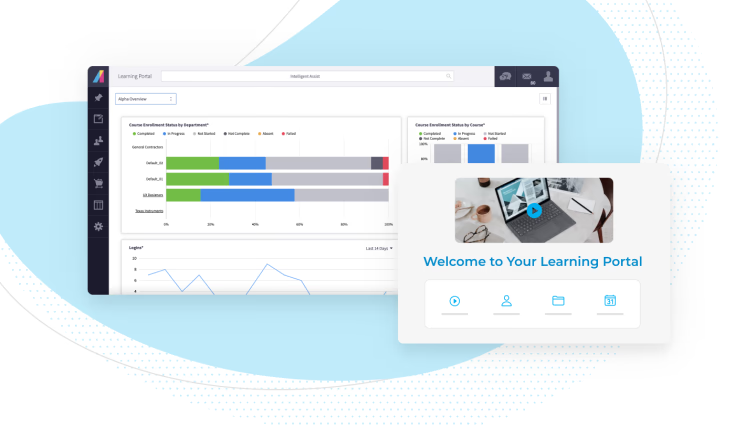Finding the right learning platform can make or break your employee development strategy. Whether you're modernizing your training approach or struggling with a system that creates more complaints than completed courses, this decision carries a lot of weight.
The learning tech market is crowded with platforms making big promises. Sales demos dazzle with flashy features—but once implemented, many L&D pros discover these tools don't deliver the transformation they expected. Pick the wrong one, and you waste resources on something employees actively avoid. Choose the right one, though, and you can revamp how your company develops talent.
To help, we put together this guide to the 15 best learning experience platforms of 2026. We've looked beyond marketing claims to highlight solutions that genuinely deliver, helping companies create personalized learning, increase engagement, and build valuable skills across the organization.
What is a learning experience platform?
A learning experience platform (LXP) is a modern approach to support employee development. Unlike conventional systems that deliver the same training content to everyone, an LXP personalizes the experience for each employee.
These platforms use AI and data analytics to recommend resources based on individual needs, preferences, and career goals. Think of them as smart learning assistants that get better the more you use them.
Key features of the top learning experience platforms
What truly distinguishes exceptional learning experience platforms from those that fall short? The best LXPs have a few key features that take training from average to impactful. These include:
- AI that personalizes learning. Top platforms use advanced AI to identify individual skill gaps and deliver exactly what each employee needs, when they need it. These systems continuously refine their understanding of each learner and create personalized paths that shift as roles and goals change.
- Social space for real collaboration. Training works best when people learn together. Modern platforms enable teams to share knowledge and solve problems as a group. Social learning features like discussion forums, newsfeeds, and gamification make learning stick better than studying alone.
- Content creation tools anyone can use. The best LXPs provide intuitive tools that let internal teams share knowledge without technical skills. This democratizes content creation so subject matter experts can develop training materials with templates, drag-and-drop editors, and media integration.
- Analytics that tell you what matters. Leading platforms don’t just show completion rates, but also engagement and skill development across departments. Advanced business intelligence tools turn learning data into visual dashboards and actionable insights so you can improve strategy and show tangible ROI to leadership.
- Integrations that fit into your workflow. Top learning platforms connect seamlessly with existing work tools like HCM software, CRM systems, or other applications, without disrupting productivity. Rather than forcing employees to visit separate platforms, these integrations bring relevant content right where work actually happens.
- On-the-go access. LXPs let people learn during in-between moments throughout the workday, regardless of location or device used. The best platforms offer mobile experiences with responsive design, offline capabilities, and progress that syncs automatically across all devices.
- Microlearning that works. Leading platforms deliver focused, concise content that respects busy schedules and improves retention through spaced repetition. These bite-sized modules (usually 5-10 minutes) target specific objectives without overwhelming people. The result? Learning shifts from a one-off event into a daily practice.
The top platforms bring it all together with simple design so development feels less like a task and more like a natural part of your culture.
The differences between LXP and LMS
Wondering how an LXP differs from a learning management system (LMS)? A traditional LMS mainly handles formal training programs and compliance requirements. It's administrator-driven, focusing on assigning courses, tracking completions, and managing certifications.
Your LXP, on the other hand, puts control in the learner's hands. While it can include formal training, it takes it a step further with discovery-based learning, social collaboration, and personalized upskilling.
The 15 best learning experience platforms
We’ve done the research and narrowed down the following platforms as standouts in the learning experience market today. Each brings unique strengths to support different learning needs.
1. Absorb LMS
.avif)
G2 rating: 4.6/5 (805 reviews)
Absorb stands out as a market leader by successfully bridging the gap between traditional LMS functionality and modern LXP capabilities.
What separates the award-winning platform from competitors is its ability to create a solution that works for both administrators and learners, without compromising either experience. Learners stay engaged with features like gamification, personalized learning paths, and social learning tools. Administrators get a comprehensive suite of tools to easily create courses, track progress, and measure success through customizable dashboards and automated reporting.
Absorb Infuse brings microlearning into tools employees already use, from CRM systems to communication platforms, so there’s no need to switch platforms and lose productivity. Its AI-powered set of capabilities simplifies admin tasks while creating more learning opportunities for users.
Absorb also offers personalized pricing for every enterprise. This tailored approach ensures users only pay for what they need, avoiding unnecessary costs.
2. Degreed
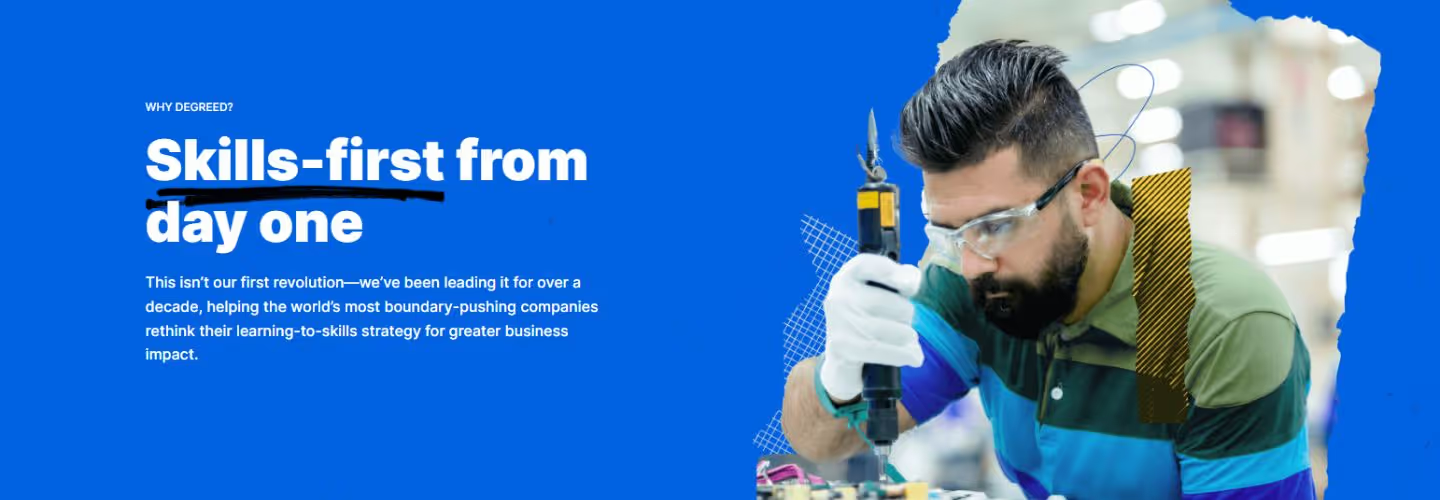
G2 rating: 4.3/5 (42 reviews)
Degreed unites lifelong learning with data-driven development, placing skills at the center of all work. Founded in 2012 with the mission of "jailbreaking the degree,” the learning platform tracks and recognizes all learning that happens beyond formal education.
Through AI tech, Degreed delivers personalized learning experiences—including upskilling, reskilling, and deep skilling—that benefit both individuals and businesses. Their platform bridges the gap between traditional education and practical workplace skills.
3. EdCast by Cornerstone

G2 rating: 4.1/5 (516 reviews)
With Cornerstone's acquisition of EdCast, the platform delivers comprehensive employee experience journeys that connect learning, skills development, and career mobility within a single ecosystem. The company's AI-powered knowledge cloud aggregates and tags content from external sources while making internal expertise more discoverable.
EdCast creates a unified talent experience that helps organizations build skills and improve employee engagement. The platform has 140 million users, over 7,000 customers, and operates in 180 countries.
4. Docebo Learning Suite
.avif)
G2 rating: 4.3 out of 5 (722 reviews)
Founded in 2005, Docebo helps organizations to deliver scalable, personalized learning globally, enhancing productivity, engagement, revenue, and growth. It embraces machine learning and generative AI to create high-quality, relevant, and personalized learning content. The platform offers features like a rich content marketplace, pre-built integrations, and data-driven insights.
5. 360Learning
.avif)
G2 rating: 4.6/5 (539 reviews)
360Learning sets itself apart from other systems with its collaborative learning approach to talent development. It enables companies to upskill from within by turning their experts into champions for employee, customer, and partner growth. With AI-enhanced capabilities, the platform empowers L&D teams to identify skill gaps, capture expert knowledge, and deliver targeted learning experiences.
The platform enables experts to easily create and share knowledge, turning organizations into learning communities where employees teach and learn from each other. 360Learning works with 1,700 organizations and has 400+ team members across the US and EMEA.
6. Fuse Universal
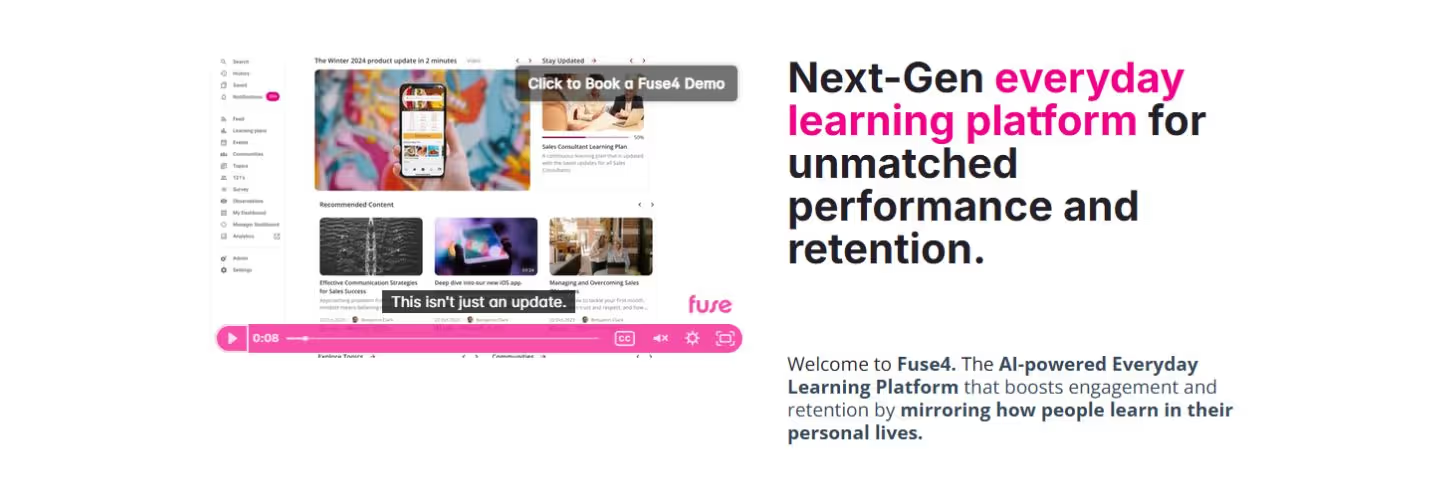
G2 rating: 4.4/5 (21 reviews)
Since 2010, Fuse Universal has connected users with the knowledge and expertise they need to improve their skills and perform at their potential. Headquartered in London, the all-in-one learning platform combines LMS and LXP capabilities to help forward-thinking organizations move toward more engaging learning methods.
Fuse delivers solutions for employee onboarding, sales enablement, customer training, analytics, compliance, and more. It’s used by over 150 organizations worldwide.
7. Valamis
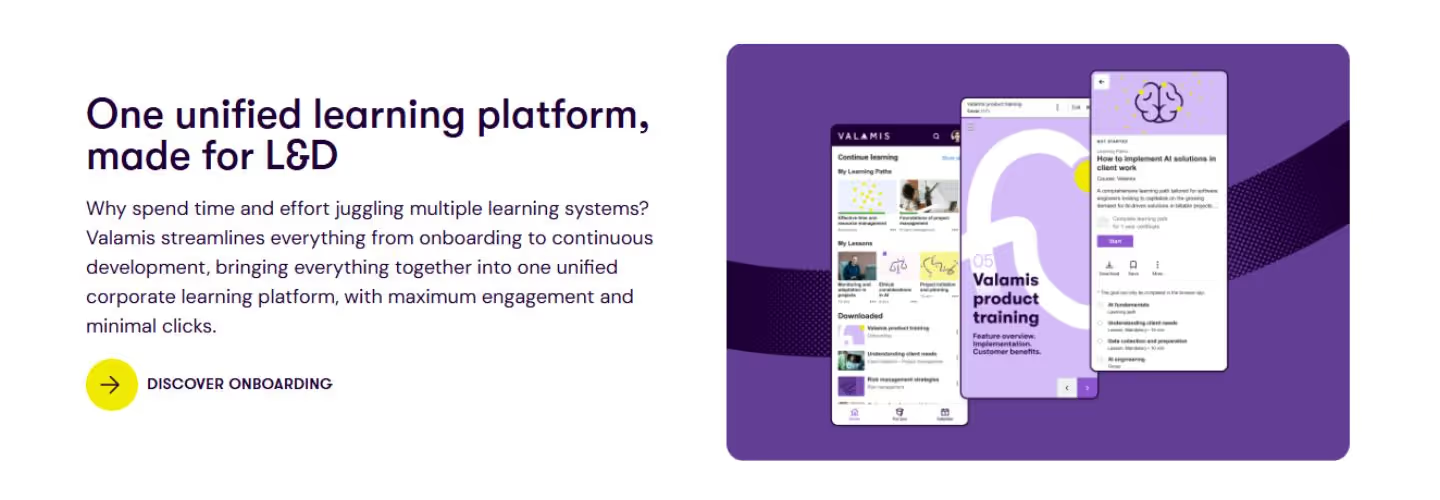
G2 rating: 4.6/5 (13 reviews)
Valamis was founded in 2003 with a vision to understand how people learn best. The all-in-one learning platform fuses standard LMS and LXP capabilities with built-in content authoring tools, skills capabilities, and advanced analytics. It also offers eCommerce capabilities and multiple integrations with content providers.
The company is headquartered in Finland, and has offices in the US, the UK, Germany, the Netherlands, and India. Clients include large organizations across diverse industries, such as finance and insurance, complex manufacturing, and professional services.
8. Thrive Learning
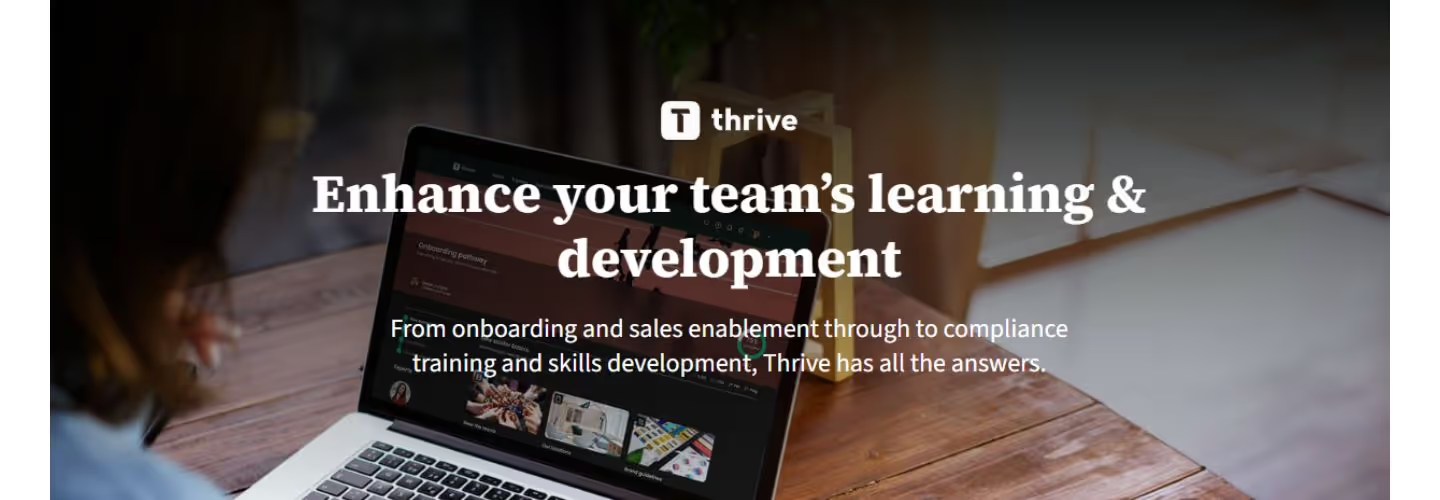
G2 rating: 4.5/5 (89 reviews)
Thrive is an all-in-one learning platform that revamps learning, communication, and knowledge management. Its features include compliance management, social learning, and analytics.
It's known for Kiki, its customizable AI sidekick that surfaces knowledge wherever it's kept, delivers instant answers, guides users to the next level and automates workflows. Over 450 brands across 60 countries use Thrive.
9. Learn Amp
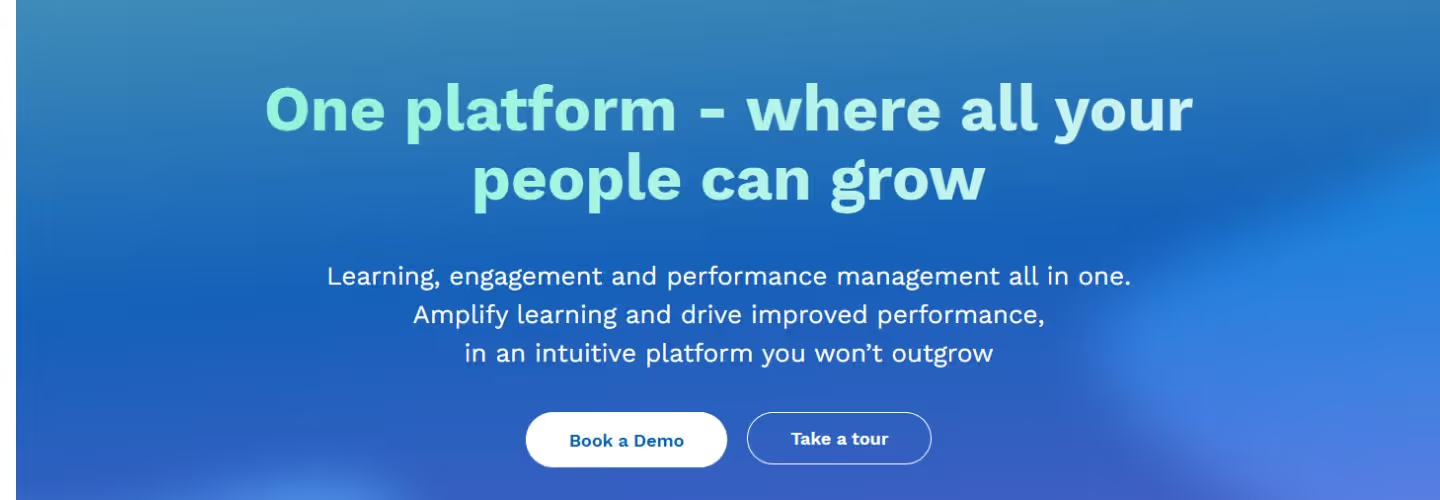
G2 rating: 4.8/5 (47 reviews)
Learn Amp combines elements of learning management systems, learning experience platforms, talent development, and performance management tools into one platform. Its intuitive platform supports learning, development, and performance across the employee journey. The company is headquartered in London and partners with customers around the world.
10. LinkedIn Learning Hub
.avif)
G2 rating: 4.4/5 (700 reviews)
LinkedIn Learning Hub is a skill-building platform that provides users with a one-stop shop for their organization's learning content. Powered by real-time insights from the world’s largest professional community, it delivers the intelligence to unlock careers that drive business growth. It offers personalized content recommendations, community-based learning, and skills development insights.
11. SAP SuccessFactors Work Zone
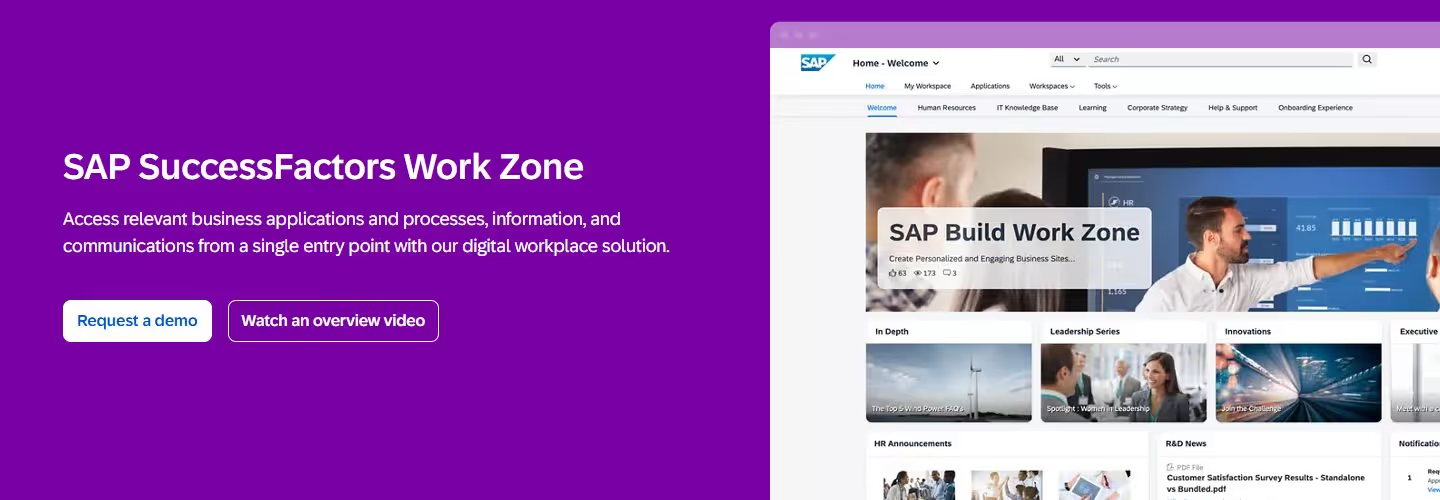
G2 rating: 4.3/5 (223 reviews)
SAP SuccessFactors Work Zone empowers organizations to enhance employee engagement with an intuitive and personalized digital workplace experience. Teams can use the platform to engage employees through customizable, guided experiences that integrate with different products. Employees can also create communities where they can share knowledge and experiences with multimedia and microlearning capabilities.
12. Rallyware
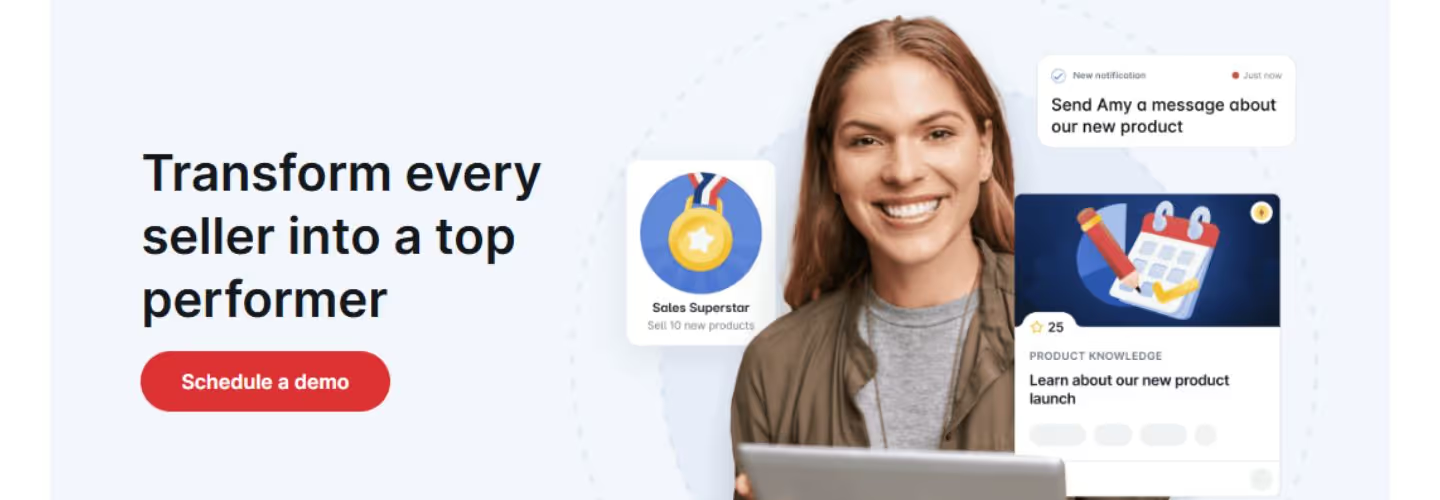
G2 rating: 4.8/5 (49 reviews)
As a leader in direct selling, Rallyware boosts seller productivity by optimizing performance through personalized activities. Rallyware’s platform, available as native mobile and web apps, consolidates multiple performance-enabling tools into a single digital experience.
Rallyware was founded in 2012 at the Massachusetts Institute of Technology with the goal of automating and scaling engagement of distributed groups through technology. Today, it works with 200+ customers in more than 90 countries.
13. NovoEd
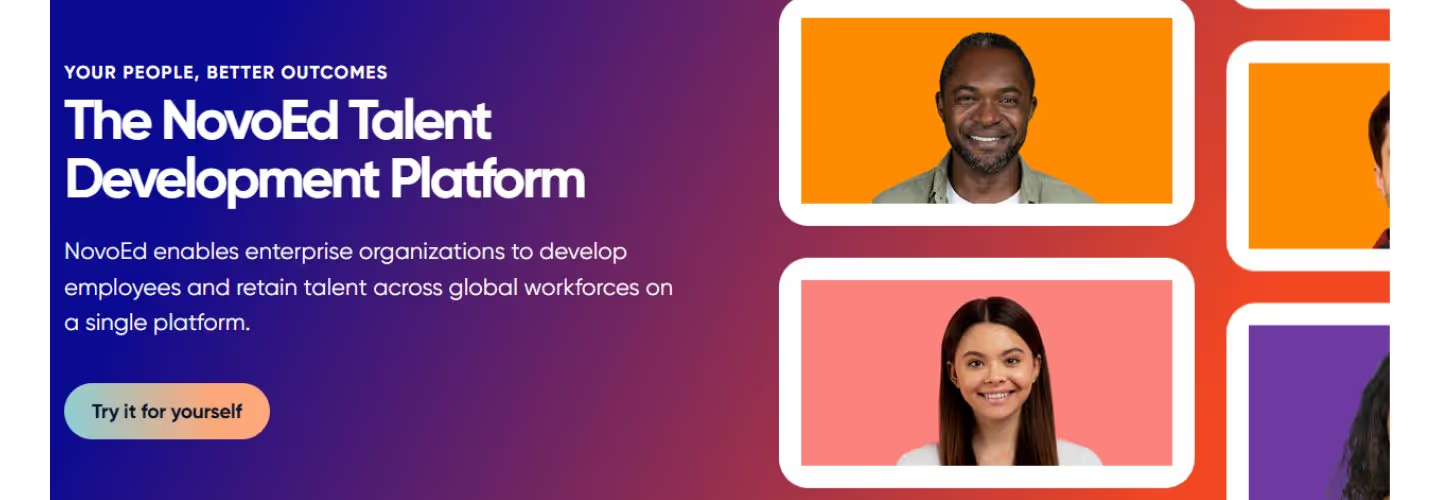
G2 rating: 4.6/5 (39 reviews)
NovoEd’s collaborative learning platform helps organizations design and deliver experiential learning that accelerates business performance globally.
Since its founding in 2012 at Stanford’s social algorithm laboratory, companies have used it to develop valuable capabilities through focused practice, coaching, mentorship, and collaboration.
14. Continu
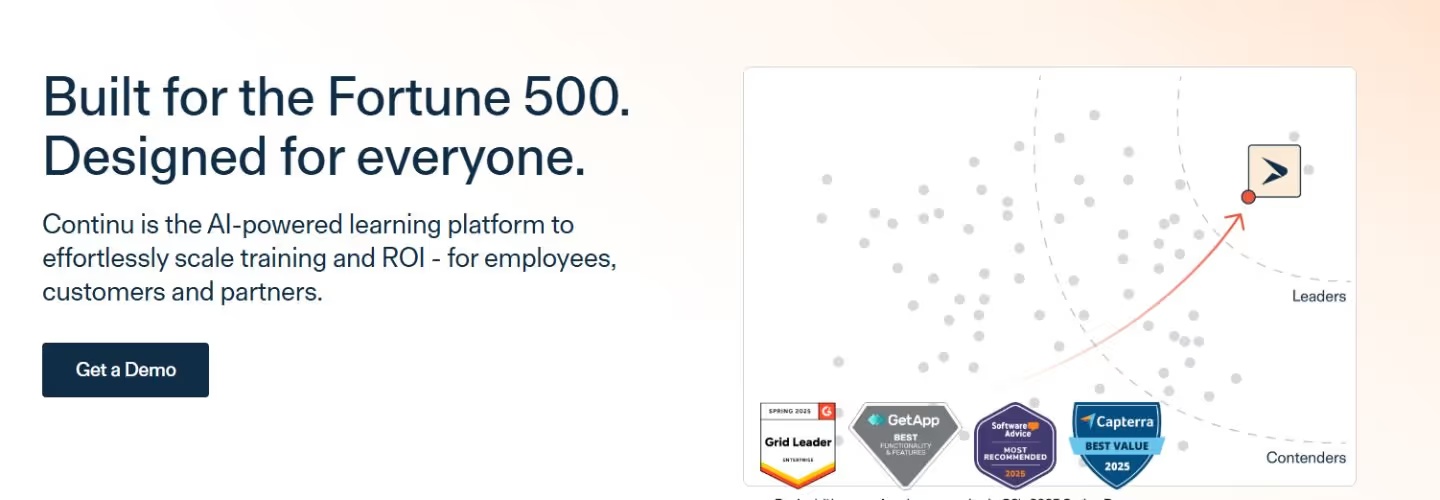
G2 rating: 4.6/5 (696 reviews)
Continu is a modern learning management system designed for mid to large-scale organizations. The platform is built to centralize learning initiatives, increase training ROI, boost customer retention, and improve employee performance. Continu is ideal for organizations that want to simplify the learning experience by integrating with everyday tools like Slack, Google Workspace, and Zoom.
15. LearnUpon
.avif)
G2 rating: 4.6/5 (194 reviews)
LearnUpon was founded on a belief: that learning should be simple, and its impact should be big. By championing simple, learner-centric experiences and results-focused support, LearnUpon gives teams the tools to deliver learning that impacts performance, retention and growth.
Benefits of using the top learning experience platforms
Why are organizations increasingly turning to LXPs? The benefits speak for themselves:
- Engagement soars. People want content that speaks directly to their needs and interests. Organizations implementing LXPs tend to report higher participation rates compared to traditional learning approaches, with users voluntarily spending more time exploring relevant content.
- Critical skills develop faster. Teams build capabilities through targeted, personalized learning paths that address specific gaps. By focusing precisely on what each person needs, rather than generic training, they close skill gaps more efficiently and adapt more quickly to evolving business requirements.
- Data-driven decisions replace guesswork. Learning leaders can see exactly what's working and what needs adjustment. They can identify content that drives the most behavioral change and shift resources from ineffective programs to high-impact learning experiences.
- Knowledge actually sticks. Learners retain information through varied content formats and strategic reinforcement at optimal intervals. Spaced repetition, mixed media, and practical application opportunities dramatically improve retention rates.
- Employee experience improves. Team members feel supported as learning becomes seamless, relevant, and even enjoyable. When professional development feels less like an obligation and more like a valuable resource, it contributes to workplace satisfaction and organizational culture.
- Career development accelerates. Individuals can chart their own growth journey with expert guidance. Employees who clearly see how learning connects to their advancement opportunities are more likely to stay with your organization longer, cutting replacement costs.
Finding the right fit
The learning experience platform market keeps growing (and getting smarter). When selecting the best platform for your organization, carefully consider your learning culture, your tech stack, and the skills your people need to develop both now and in the future.
Remember that even the most advanced platform requires thoughtful implementation and ongoing management. Technology is just one part of an effective learning strategy. It also needs to be supported by clear objectives, compelling content, and an organizational culture that values and rewards continuous development.
Ready to take action on your learning strategy? Book a demo today to see our AI-powered LMS.
Frequently asked questions
How long does it typically take to implement a learning experience platform?
Implementation timelines depend on your organization's size and requirements. Most successful implementations use a phased approach, starting with core features before adding advanced functionality. Work with your vendor to create a realistic timeline tailored to your specific needs.
How do I measure ROI from our learning experience platform?
Measuring ROI starts with establishing clear objectives before implementation. Beyond traditional metrics like completion rates, consider indicators that connect learning to business outcomes: time-to-proficiency for new hires, internal mobility statistics, knowledge application in real projects, and performance improvements following targeted learning interventions.




